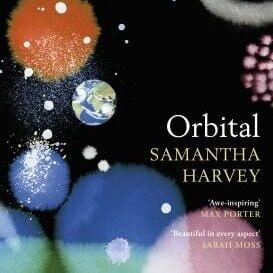Space dreams

Samantha Harvey’s Booker Prize-winning novel Orbital explores the complex relationship of space and time:
‘Space shreds time to pieces. […] In their rotations around the earth in accumulations of light and dark in the baffling arithmetic of thrust and attitude and speed and sensors, the whip-crack of morning arrives every ninety minutes.’
The novel meditates on the effects of being in space, described as ‘a deep, dark unswimmable sea’:
‘But there are no new thoughts. They’re just old thoughts born into new moments — and in these moments is the thought: without the earth we are all finished. We couldn’t survive a second without its grace, we are sailors on a ship on a deep, dark unswimmable sea.’ (p.8)
After recalling the ‘utilitarian’ Russian quarters of the International Space Station, the narrative of Orbital reflects on its contrast with a “gleaming capitalist Western space dream”:
No gleaming capitalist Western space dream here; no, a grey, utilitarian heftiness, a temple to sturdy engineering and the genius of the pragmatic. A time capsule of the post-Soviet years, the last echoes of a lapsed century. There is an attempt at home-making, to say this is a floor and this is a ceiling and this is the right way up, to defy the spaceness of space that dominates the other modules where up and down and left and right are vanished concepts. But its stab at cosiness is in vain, there’s nothing cosy about Velcro walls and kilometers of cabling and flat buzzing light, and in the end it’s neither space-age nor domestic – more a subterranean bunker which, all the same, they hold in great affection – for its efforts at comfort, failed thought they are.’ (p.96)
The space trash of a swarm of decaying satellites is vividly represented in this passage:
From an outside view you’d see them wend a long-untrodden man-made trail between two birling spheres. You’d see that far from venturing out alone, they navigate through a swarm of satellites, a midgey seething of orbiting things, two hundred million flung-out things. Operating satellites, ex-satellites blown into pieces, natural satellites, flecks of paint, frozen engine coolant, the upper stages of rockets, bits of Sputnik 1 and Iridium 33 and Kosmos 2251, solid-rocket exhaust particles, a lost toolbag, a mislaid camera, a dropped pair of pliers and a pair of gloves. Two hundred million things orbiting at twenty-five thousand miles an hour and sandblasting the veneer of space. (pp.130-131)
Shared by Dr Niall Gallen, EDACS